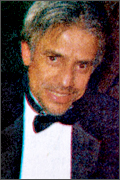Ananda Dabare takes on Tchaikovsky

|

Ananda Dabare |
As music lovers take their seats at Ladies College Hall on May 23,
they will be face to face with Peter Tchaikovsky under the baton of
Ananda Dabare when the Symphony Orchestra of Sri Lanka presents the
Masters. Dabare will conduct Greig, Tchaikovsky and Rachmaninov in a
banquest of delicious music, all spiced in romance and tossed in
virtuosity.
To watch Dabare conduct the Masters is in itself a musical experience
which very few Sri Lankan conductors can rise to, but Dabare has many
more years to conquer if he intends stepping on to international concert
halls for conducting. But for the moment, he is Sri Lankaís dream.
Peter Tchaikovsky (1840-1893) scored his First Symphony in 1866,
Second Symphony.
In 1873, the Third Symphony in 1875 and the Fourth Symphony in 1877
which Dabare will conduct on Sunday.
Stirring up heartburns and agony that Tchaikovsky went through while
composing the Fourth Symphony are driven with force when Dabare will
wield the baton in passion and emotion, is justice for this Master who
made unsuccessful attempts at suicide due to a disastrous marriage that
left him distraught.
Tchaikovsky was abroad when he completed the Fourth Symphony and
dedicated it to Madam Von Meck. He was well established in Russia in
1880 and the success of his Serenade to Strings and the First Piano
Concerto brought him instant international fame and success.
Romantic scores
One of the most romantic scores of the era, it is still in full swing
at all concert halls around the world and I saw it played live at the
Royal Festival Hall last year. Tchaikovsky is famous for his score for
the Swan Lake and Serenade for strings and was accurate, dominant in all
the symphonies he composed.
Thus, he became the Master of classical music with few to challenge
his virtuosity. His music is still the first choice of all conductors
and choreographers not only in Russia but around the world. He scored
his Fifth Symphony in 1888 and the final Sixth Symphony in 1893 the year
he died.
Strict disciplinarian
As all talented violinists and conductors are, Dabare is no different
to his clan when he picks his music for playing and conducting. I have
listened to him playing over and over again in the last years with
fascination and with each performance, my ardour to him increasing. He
is my favourite local violinist.
I like the way he plays; never in a hurry; never overscoring,
overlapping notes or untimely pausing within notes and bars. Dabare is a
strict disciplinarian to classical music and his heart and soul lay
there. What he presents to the Sri Lankan audiences is the depth and
spirit of the past Masters. Obviously, his passion with Tchaikovsky is a
long standing bondage between a Master and his disciple.
And Dabare is clever, does proud to Tchaikovsky and the rest of the
composers he has picked for the concert. Fourth Symphony was referred to
as a symphonic poem that annoyed the great Master and he quickly
introduced three more movements before it was called the Fourth
Symphony. So, there is much musical history behind this iconic score.
Dabare found the score most effective and dramatic and distinctly
Russian. They all add to the work of a genius whose orchestral
repertoire keeps responding to its emotional intensity and power.
Sergey Rachmaninov (1873-1943) is third generation pianist of his
family. He was born to and old aristocratic family where tradition was
at its best and naturally inherited their musical talent. The Piano
Concerto No.1 billed for performance is a tribute to his spirit and
Dabare conducts the score with much fervour and dedication. Rachmaninove
score four Concertos and they all became a success.
1891 First Piano Concerto
1901 Second Piano Concerto
1909 Third Piano Concerto
1926 Fourth Piano Concerto
He completed the Third Piano Concerto in 1936
Edvard Greig (1843-1907) scored incidental music for Ibsenís Peer
Gynt in 1876 as many have missed because of his limited writing. He was
closely involved in Bergenís musical life. Though Greig became a
national figure, he was not as famous as Tchaikovsky or Rachmaninov. He
spent years and years of tireless work, composing and conducting
symphonies and concerts. Greig was undervalued during his lifetime but
rose steadily and slowly to become the best loved Norwegian composer.
When Dabare conducts Greig, he will be evoking the mysterious world
of Peer Gynt and Mountain King.
And listen carefully to feel the emotion that Greig incorporated to
Peer Gynt and then and then will you realise why Ananda Dabare is
conducting this score for your benefit.
A great contribution by Harsha Aberatne at the piano, playing with
passion and romantic ardour, makes the Romantic Masterworks a memorable
event. |



